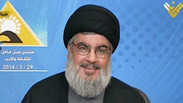
Nasrallah made his speech at the launch of a cultural center and theater in southern Lebanon via a television link from a secret location in South Lebanon. This was his first speech since Israel's alleged strike in the Lebanese-Syrian border area a month ago, an attack that was acknowledged in an unusual move by Hezbollah, that admitted the strike targeted one of the organization's facilities in the Bekaa Valley.
According to Nasrallah, thanks to the resistance's deterrence, the villages in southern Lebanon are protected and Israel is carefully considering its moves.
"The Israeli enemy knows better than the Lebanese people how the resistance's ability of deterrence has developed, and this is a part of Israel's considerations," he boasted.
Related stories:
- Israeli enemy is not forgotten, says Hezbollah's Lebanese mouthpiece
- Lebanese PM could quit over Hezbollah's 'resistance to Israel' demand
- Assad used escalation in Gaza to deliver weapons to Hezbollah
"The military's jihad activity, the firm stance and the willingness to sacrifice, are an expression of the culture of resistance," Nasrallah said, claiming that "the argument in Lebanon about the resistance is not about the involvement in Syria, the (2006 Second Lebanon War) or other events, it started with the formation of the Zionist entity."
Nasrallah cautioned that the younger generation might be misled into thinking that the resistance has failed because of Hezbollah's involvement in the Syrian conflict, or because of the organization's stance on one issue or another. But, Nasrallah said, "the resistance is in Lebanon since 1948 and some people don't know that."
He also used the speech as an opportunity to convince skeptics in Lebanon of the necessity of Hezbollah's involvement in the three-year-long war Syrian President Bashar Assad is waging against opposition militants.
"Some in Lebanon say the resistance (Hezbollah) has nothing to do with Syria," Nasrallah told supporters.
He justified sending his forces to a foreign war by saying that Sunni rebel groups would "eliminate everyone in Lebanon" if they won in Syria.
"The problem in Lebanon is not that Hezbollah went to Syria, but that we were late in doing so," he said. "This resistance will remain solid, with its head hung high, protecting its people and its nation."
Established nearly 30 years ago to confront Israel's occupation of south Lebanon, Hezbollah once won praise from Sunnis and Shi'ites across the Middle East. But its fight alongside Assad has lost it much domestic and international support.
Hezbollah threatens retaliation
Hezbollah recently threatened Israel, promising to retaliate in a time and place of its choosing to the attack on the Syrian-Lebanese border.
Following reports of the strike and Hezbollah's threats, several incidents occurred on the northern border. Rockets were fired at an IDF outpost on Mount Hermon, and there were several incidents of explosive devices being planted in the Golan Heights area and on the Lebanese border.
Israeli assessments are that Hezbollah was involved in these incidents in one way or another.
"New ground rules according to the resistance," was the headline of an opinion piece written by Ibrahim Al-Amin, editor of Lebanon's heavily pro-Hezbollah newspaper Al-Akhbar, which was published several days after the attack on the Israel-Syria border in which four IDF soldiers were wounded.
Al-Amin, who is considered Nasrallah's mouthpiece, linked Hezbollah to the recent incidents on the northern border and bragged that Israel did not assess Hezbollah's respond properly.
He further wrote that compared to the Syrian arena, where according to reports Israel had struck and calm was maintained, in Lebanon the situation is different. "Israel's problem is not only its wrongful speculation about the nature of the response of the Syrian regime or Hezbollah over the ongoing escalating tensions, but it thinks that things can be done while it chooses to act unilaterally," it was claimed.
"It is true that enemy forces attacked Syrian outposts in front of the occupied Golan, but Israel knows that an attack would not change a thing in the new reality."
Reuters contributed to this report.















